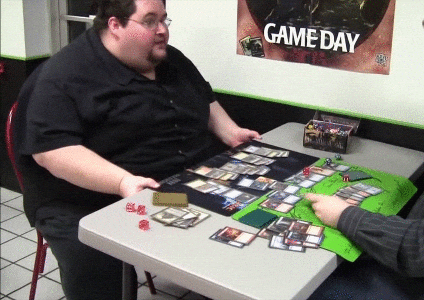
And the night got deathly quiet and his face lost all expression.
Said, "If you're gonna play the game, boy, you gotta learn to play it right."
You got to know when to hold 'em, know when to fold 'em
Know when to walk away and know when to run.
- Kenny Rogers, "The Gambler"
Candyland Can Go Fudge Itself
Candyland isn’t a game.
Ok, technically it is a game.
Let’s settle for “horrible game.”
You’ve been there: Staring at that innocent, snow-white stack of cards, the lightyear of neon tiles woven through a sugar-coated dreamscape, children frothing in anticipation of a romp through that fabled confectionary kingdom.
30 minutes later you’re bored, pissed, and ready to flip the table.
Here’s the problem:
Games need rules, this is obvious. They also need to give players a sense of agency. In other words, allow them meaningful choices and some control over their destiny. They need clear reasons why those choices result in gaining or losing ground. Great games respect your time investment and reward your attention with gratifying challenges and memorable moments of triumph and defeat.
Candyland has none of that sh*t.
Highway to Hell
This is a Candyland turn: Draw a card, do the thing the card says, turn over. You’ve made zero decisions. You’re bound by the rules to draw a card and do what the card says. That’s it. You don’t get to choose whether or not do to what the cards says (Sartre would disagree), to figure out a clever workaround, to make a key sacrifice that could be painful now, but pay off later. You do the thing on the card. That’s the “game.”
In essence, the experience is predetermined. You are just playing out what the deck had in store for you since you sat down. That, my friends, is not a game. That’s torture. Now, some people might say: “Hey, that’s a lesson! That’s life!”
The Beatings Will Continue Until Morale Improves
They’d be so wrong as to qualify for a swift clap across the jaw.
You have choices in life. You have agency. Life doesn’t happen to you. You happen to life. Yes, there are things beyond your control, but you can respond to them in meaningful and empowering ways. In Candyland, you get stuck in the licorice and you can’t so much as try to sacrifice your boot to gain your turn back. You just sit there and take it while your cackling friends lap you on the way to utopia. That’s not a lesson.
That’s—there’s a theme here—torture.
The Most Precious Resource
The game doesn’t care that you spent 25 minutes suffering through all of this monotonous pantomime. Someone wins in the end, and who cares? By the time it's over you have children pouting, outright refusing to play, wondering why the game isn’t “any fun anymore”—God forbid an adult win (we’ll handle this in a minute)—and, for what? What did we get for all this?
Not a damn thing.
Torture.
The Only Way to Win is Not to Play
We can’t pretend like Candyland is going to fix itself, but if you need to, for some reason, “play” this abomination, try the following to make it more game-like and less piercing-your-own-nipple-with-no-anasthetic-like:
Play by the “Advanced” Rules
The modern version of the game comes with rules for “older kids”—whatever that means—where you draw two cards on your turn and choose which card to play.
This works until both cards suck hard.
Some folks suggest allowing a bit of homebrew where you can sacrifice your turn to draw two new cards to be played on your next turn. Now, we’re getting somewhere. But, a game that requires you to write 100% more rules for it is a crap product. Remember that.
Do Your Best David Copperfield Impression
I love what this Redditor suggested—and maybe we’ve all tried this at some point with varying degrees of success—grab the “winning” cards and stack the deck so the game is close (but still predetermined…) and over within a reasonable amount of time. If you have to “play,” you shouldn’t also have to waste 30+ minutes of your life on it. Get to a conclusion, and go play something else.

Put the “Game” in the Trash and Play Something Else
The game exists in limbo: its rules are simple enough for young children to learn, but by the time they can play by these rules, they’re ready for better games with more strategy and satisfying mechanics. The “game” holds no lessons for older kids. It teaches adults what swallowing glass feels like.
It’s a product with no audience.
Here are better products you can try that won’t make you nuts, don’t force you into amateur magician territory, and are fit for Candyland-aged children (and adults!):
-
Orchard - co-op roll-and-count where you fill your basket with a fruit harvest before a hungry raven steals your crop. Lower agency overall, but co-operative and less abrasive than that head-to-head saccharine murder-fest.
-
No-Stress Chess - A play-as-you-grow version of chess that takes the hard decision-making out for younger audiences while teaching piece movement and the basics of the game. You choose how complicated the game is; lots of visual aids for young learners. Great product.
-
The Fuzzies - it's fuzzy Jenga and setup happens within seconds, not years like the OG woodblock version. A cute card-draw mechanic provides a little bit of randomness and problem-solving intrigue.
-
Hero Kids - a stripped-bare version of Dungeons & Dragons with easy adventures and simple character management. Unlimited potential for creative storytelling. Infinite agency, but a little more prep and know-how for the adult to keep it all on the rails (if you’re an experienced dungeon master grownup, this is a cakewalk).
Now go forth and play something that doesn't suck.
You're welcome.
Sign up for the PlayArchitect Games Newsletter today and get every article and update right in your inbox!